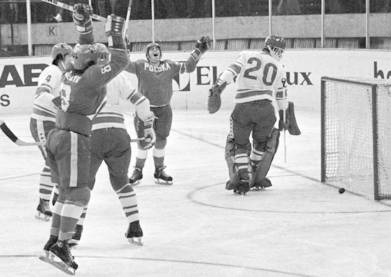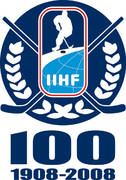Story #39
April 8, 1976 — Katowice, Poland
On this remarkable spring day hockey fans around the world had to look twice, three times and once again at the scoreline to believe what they saw: Poland – Soviet Union 6-4.
Misprint? No. Only the biggest shocker in international hockey history up to that point.
In order to understand the magnitude of this win, which happened on opening day of the 1976 IIHF World Championship, in the Polish coal mining city of Katowice, one must understand the background to the story.
At the time, the Soviet Union’s Big Red Machine was virtually unbeatable. Only two months earlier, the Soviets had cruised through the 1976 Olympics en route to their fourth straight Olympic gold hockey medal. In that tournament, the Soviet Union crushed Poland, 16-1. Coming into the first World Championship hosted by Poland in 46 years, the Soviets had won 12 out of the last 13 IIHF World Championships.
The CCCP squad had a team with goaltending legend Vladislav Tretiak; defencemen Valeri Vasiliev, Vladimir Lutchenko, and Gennadi Tsygankov; forwards Valeri Kharlamov, Boris Mikhailov, Helmut Balderis, Alexander Yakushev, Alexander Maltsev, Sergei Kapustin, Viktor Shalimov, and Viktor Zhluktov.
This was a team that had lost only one competitive game since 1972 and had compiled a goals for and against difference of 294-63 in the three last World Championships (1973-75) and the 1976 Olympics in Innsbruck, Austria. In the last seven official games between the Soviet Union and Poland prior to the April 8, 1976 encounter, the USSR team had compiled the following scores: 9-3, 20-0, 8-3, 17-0, 13-2, 15-1 and 16-1.
In other words, what the 10,000 Polish fans at Katowice’s Spodek arena were expecting on this spring Thursday was another slaughter. The Polish objective was simple: keep the score down. Any loss in single digits would be considered a success. A score like 4-2 for the Soviets would have been a dream. Suggesting a tie was not even funny.
Soviet head coach Boris Kulagin knew that his team would score at will and decided to start seldom used backup goaltender Alexander Sidelnikov from the Soviet Wings. But at 10:21 of the first period Miczyslaw Jaskierski gave Poland the lead and four minutes later Ryszard Nowinski made it 2-0 after 20 minutes. The Polish crowd went wild but was silenced only 31 seconds into the second period when Boris Mikhailov put the Soviets on the scoreboard.
Now the Big Red Machine would surely come alive. They did. But on this day, the Soviets were in their white road sweaters. The underdog Poles were in red and they played like they believed that they were the world champions. Wieslaw Jobczyk, a totally unknown 22-year-old forward who was about to play the game of his life, made it 3-1 just two minutes after Mikhailov’s marker, and, 16 seconds later, at the 3:00 mark of the second, Jaskierski struck again with his second goal to make it 4-1 Poland. The arena was mayhem.
Coach Kulagin, who was fuming on the bench, decided to pull Sidelnikov at the four-minute mark of the middle period and Tretiak came off the bench to stem the tide. It was just the medicine the Soviets needed. Boosted by the presence of their top goalie, Yakushev scored at 5:14 to make it 4-2.
But this night would belong to Jobczyk. Just as after Mikhailov’s first goal, the Poles replied immediately and Jobczyk netted his second at 6:40 to make it 5-2 for Poland. Not even the great Tretiak could hold back the home team tonight, which was playing like it had divine support.
The Soviets were trailing the whipping boys of international hockey 5-2 after two periods and coaches Kulagin and Loktev didn’t even enter the dressing room during intermission. The crowd was going absolutely mad. Fans were singing without pause and the fact that Valeri Kharlamov scored to make 5-3 with seven minutes left didn’t seem to affect them a bit. Goaltender Andrzej Tkacz made save after save at the other end and he kept his team from waking up from this beautiful dream.
With only 20 seconds remaining, with the Katowice arena a complete madhouse, Jobczyk scored his third goal of the game. No one seemed to take notice when Kharlamov made it 6-4 with five seconds left.
The Soviets where shocked, the Polish players where almost too tired to find the words to sing their national anthem, but the crowd was overwhelmed. That night, the fans’ singing raised the roof.
The result affected both teams significantly. The Soviet team could not recover. They lost to the Czechoslovaks and the Swedes and finished second in the tournament, a huge upset. The mentally drained Poles could not recover, either. The next day they lost to Czechoslovakia 12-0. Poland, which tried to avoid relegation to the B pool, actually had a pretty good tournament after that, recording respectable scores. Going into the last game, the Poles needed only a tie against West Germany to win the four-team relegation group with Finland and East and West Germany.
The Poles held on to a 1-1 tie until Rainer Phillip scored with 21 seconds remaining. Poland lost 2-1, finishing the tournament with the same number of points as Finland and West Germany. Still, they were relegated on goal difference. Some 32 years later, however, the final result of the 1976 World Championship is all but forgotten. But the 6-4-score from April 8 remains an indelible moment in the chronicles of international hockey history.
As part of the IIHF's 100th anniversary celebrations, www.IIHF.com is featuring the 100 top international hockey stories from the past century (1908-2008). Starting now and continuing through the 2008 IIHF World Championships in Canada, we will bring you approximately three stories a week counting down from Number 100 to Number 11.
The Final Top 10 Countdown will be one of the highlights of the IIHF's Centennial Gala Evening in Quebec City on May 17, the day prior to the Gold Medal Game of the 2008 World Championship.
These are the criteria for inclusion on this list: First, the story has to have had a considerable influence on international hockey. Second, it has to have had either a major immediate impact or a long-lasting significance on the game. Third, although it doesn't necessarily have to be about top players, the story does have to pertain to the highest level of play, notably Olympics, World Championships, and the like. The story can be about a single moment — a goal, a great save, a referee's call — or about an historic event of longer duration — a game, series, tournament, or rule change.
|
 |
Click here for the 100 Top Stories
|










